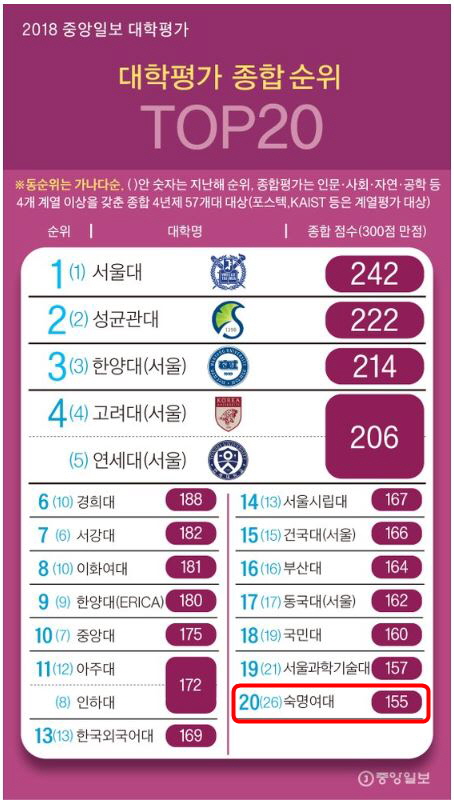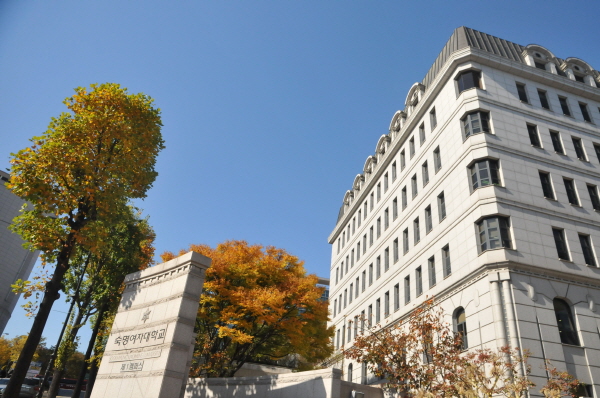Our university makes it into the Top 20 list at the 2018 Joongang Ilbo University Rankings!
- Views 3330
- Writer 커뮤니케이션팀
- 보도일자 2018-11-05
Sookmyung Women’s University took the 20th overall place in the 2018 Joongang Ilbo University Rankings. This is a 6-position climb compared to the 26th place last year. Our university made it back into the Top 20 ranking after 7 years since the 18th position in 2011.
Since the 33rd overall position in 2015, our university has made continuous efforts for 3 years (28th in 2016 -> 26th in 2017) and finally made it back to the Top 20 list. In addition, we also rose 4~7 rankings per discipline, including 14th place in humanities, 15th in social sciences, and 19th in natural sciences, as well as listing our name at the 2nd overall spot for the separately surveyed Education-oriented University Evaluation thanks to our student performance.

2018 Joongang Ilbo University Rankings - Top 20 Overall University Rankings (Source: Joongang Ilbo)
The secret to our upgraded rankings can be broken down to research by the teaching staff, student performance, reputation, etc., which all contributed to the drastic increase in points compared to the previous year’s evaluation index. In the area of research by teaching staff, there were drastic increase in the “citation per paper in international journals,” which has the highest point distribution, and the technology transfer revenue per science & technology teaching staff. In fact, our university’s revenue from technology transfer multiplied by more than 200 times during the last 3 years from 7 million KRW (2014) to 1.47 billion KRW (2017).
In the student performance category, the contribution from the entrepreneurship education stands out the most. Our university took the 20th place, a climb of 24 rankings compared to the previous year, in the index which was evaluated based on students enrolled in theoretical and practical entrepreneurship lectures, etc. We also placed 9th and 13th in the net employment rate and dropout rate, which is a 10 and 7-ranking upgrade, respectively.
Our university’s reputation also slightly increased from 35th to 32nd compared to the previous year. In the reputation survey targeting corporate human resource staff (550 people) and high school teaching staff (550 people), our university showed improvement in the areas of university providing significant contribution to community (42 ® 38), university with promising future development (38 -> 35), and university desired for recruitment (39 ® 38). The university recommendation for admission category showed no changes (23 ® 23).

On the other hand, our university showed rise in rankings for the 4 disciplinary evaluation, including humanities/social sciences/natural sciences/engineering, that was conducted in addition to the overall assessment except for the engineering college category which our school was excluded from. In the case of the humanities rankings, the entrepreneurship education ratio, domestic publication, citation by translated/authored humanities journals, etc. led the increase in index values, and in the social sciences category, the publication of translated/authored humanities journals, publication international humanities papers, ratio of teaching staff with outside experience, etc. raised the overall evaluation points. In the natural sciences category, the ratio of entrepreneurship education, technology transfer revenue per science & technology teaching staff, and net employment ratio were the most notable.
Our university’s giant step forward in this Joongang Ilbo University Rankings has been analyzed to be the efforts of our school’s continuous management of relevant indicators centered on our Office of Assessment and reforms in school system and curriculum which were diligently promoted for several past years. In fact, with the expansion of technology-based convergence courses and entrepreneurial courses since the newly established College of Engineering and selection for the PRIME projects, our school’s ratio of teaching staff with outside experience and ratio of entrepreneurship education increased dramatically. In addition, the teaching staff research performance, net employment rate of students, drop out ratio, etc., which were the key management areas, showed a climb of 10 or more positions on the average. The officials from the Office of Assessment announced, “There weren’t any other schools in the top 20 rankings which showed higher year-on-year increase rate than our school,” and “We will continuously work toward the improvement of our school’s competitiveness through substantiation of weak areas and even further improvement of our strengths.”

